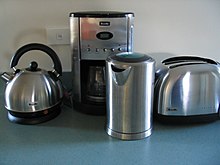Kitchen Appliances
Home appliances are electrical/mechanical machines which accomplish some household functions, such as cooling/heating, cooking or cleaning. Home appliances can be classified into:
This division is also noticeable in the maintenance and repair of these kinds of products. Brown goods usually require high technical knowledge and skills (which get more complex with time, such as going from a soldering iron to a hot-air soldering station), while white goods may need more practical skills and "brute force" to manipulate the devices and heavy tools required to repair them.
Given a broad usage, the domestic application attached to "home appliance" is tied to the definition of as "an instrument or device designed for a particular use or function". More specifically, Collins dictionary defines "home appliance" as: "devices or machines, usually electrical, that are in your home and which you use to do jobs such as cleaning or cooking." The broad usage, afforded to the definition allows for nearly any device intended for domestic use to be a home appliance, including consumer electronics as well as stoves,refrigerators, toasters and air conditioners to light bulbs and water well pumps.
While many appliances have existed for centuries, the self-contained electric or gas powered appliances are a uniquely American innovation that emerged in the twentieth century. The development of these appliances is tied the disappearance of full-time domestic servants and the desire to reduce the time consuming activities in pursuit of more recreational time. In the early 1900s, electric and gas appliances included washing machines, water heaters, refrigerators and sewing machines. The invention of Earl Richardson's small electric clothes iron in 1903 gave a small initial boost to the home appliance industry. In the Post–World War II economic expansion, the domestic use of dishwashers, and clothes dryers were part of a shift for convenience. Increasing discretionary income was reflected by a rise in miscellaneous home appliances.
...
Wikipedia

